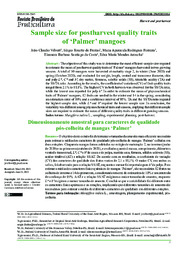Sample size for postharvest quality traits of Palmer mangoes.
Sample size for postharvest quality traits of Palmer mangoes.
Autoria: VILVERT, J. C.; FREITAS, S. T. de; FERREIRA, M. A. R.; COSTTA, E. B. S. da; AROUCHA, E. M. M.
Resumo: The objective of this study was to determine the most efficient sample size required to estimate the mean of postharvest quality traits of ?Palmer? mangoes harvested in two growing seasons. A total of 50 mangoes were harvested at maturity stage 2, in winter (June 2020) and spring (October 2020), and evaluated for weight, length, ventral and transverse diameter, skin and pulp L*, C* and hº, dry matter, firmness, soluble solids (SS), titratable acidity (TA) and the SS/TA ratio. According to the results, the coefficient of variation (CV) of fruit quality traits ranged from 2.1% to 18.1%. The highest CV in both harvests was observed for the SS/TA ratio, while the lowest was reported for pulp hº. In order to estimate the mean of physicochemical traits of ?Palmer? mangoes, 12 fruits are needed in the winter and 14 in the spring, considering an estimation error of 10% and a confidence interval of 95%. TA and the SS/TA ratio required the highest sample size, while L* and hº required the lowest sample size. In conclusion, the variability was different among physicochemical traits and seasons, implying that different sample sizes are required to estimate the mean of different quality traits in different growing seasons.
Ano de publicação: 2021
Tipo de publicação: Artigo de periódico
Unidade: Embrapa Semiárido
Palavras-chave: Amostragem, Manga, Mangifera Indica, Mangoes, Planejamento experimental, Postharvest physiology, Postharvest technology, Pós-Colheita, Sampling
Observações
1 - Por padrão são exibidas publicações dos últimos 20 anos. Para encontrar publicações mais antigas, configure o filtro ano de publicação, colocando o ano a partir do qual você deseja encontrar publicações. O filtro está na coluna da esquerda na busca acima.
2 - Para ler algumas publicações da Embrapa (apenas as que estão em formato ePub), é necessário ter, no celular ou computador, um desses softwares gratuitos. Sistemas Android: Google Play Livros; IOS: iBooks; Windows e Linux: software Calibre.
Acesse outras publicações
Acesse a Base de Dados da Pesquisa Agropecuária (BDPA) para consultar o acervo completo das bibliotecas da Embrapa.

